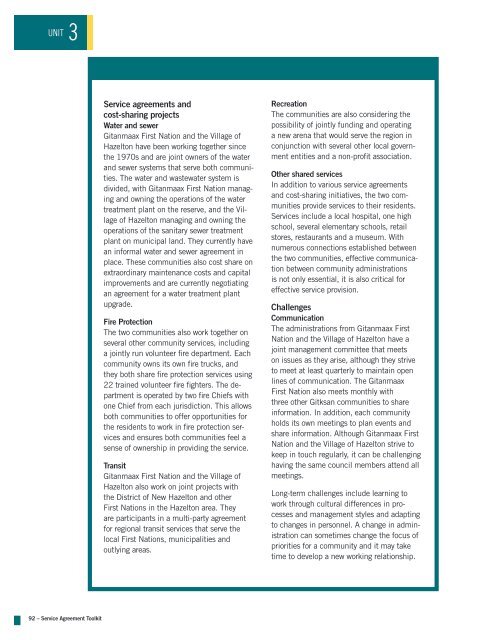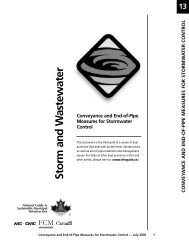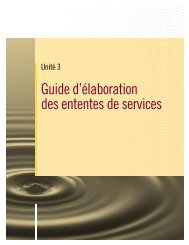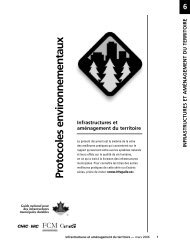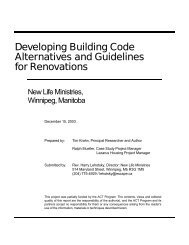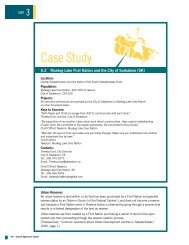Guide to Service Agreements - FCM
Guide to Service Agreements - FCM
Guide to Service Agreements - FCM
Create successful ePaper yourself
Turn your PDF publications into a flip-book with our unique Google optimized e-Paper software.
UNIT 23<br />
92 – <strong>Service</strong> Agreement Toolkit<br />
<strong>Service</strong> agreements and<br />
cost-sharing projects<br />
Water and sewer<br />
Gitanmaax First Nation and the Village of<br />
Hazel<strong>to</strong>n have been working <strong>to</strong>gether since<br />
the 1970s and are joint owners of the water<br />
and sewer systems that serve both communities.<br />
The water and wastewater system is<br />
divided, with Gitanmaax First Nation managing<br />
and owning the operations of the water<br />
treatment plant on the reserve, and the Village<br />
of Hazel<strong>to</strong>n managing and owning the<br />
operations of the sanitary sewer treatment<br />
plant on municipal land. They currently have<br />
an informal water and sewer agreement in<br />
place. These communities also cost share on<br />
extraordinary maintenance costs and capital<br />
improvements and are currently negotiating<br />
an agreement for a water treatment plant<br />
upgrade.<br />
Fire Protection<br />
The two communities also work <strong>to</strong>gether on<br />
several other community services, including<br />
a jointly run volunteer fire department. Each<br />
community owns its own fire trucks, and<br />
they both share fire protection services using<br />
22 trained volunteer fire fighters. The department<br />
is operated by two fire Chiefs with<br />
one Chief from each jurisdiction. This allows<br />
both communities <strong>to</strong> offer opportunities for<br />
the residents <strong>to</strong> work in fire protection services<br />
and ensures both communities feel a<br />
sense of ownership in providing the service.<br />
Transit<br />
Gitanmaax First Nation and the Village of<br />
Hazel<strong>to</strong>n also work on joint projects with<br />
the District of New Hazel<strong>to</strong>n and other<br />
First Nations in the Hazel<strong>to</strong>n area. They<br />
are participants in a multi-party agreement<br />
for regional transit services that serve the<br />
local First Nations, municipalities and<br />
outlying areas.<br />
Recreation<br />
The communities are also considering the<br />
possibility of jointly funding and operating<br />
a new arena that would serve the region in<br />
conjunction with several other local government<br />
entities and a non-profit association.<br />
Other shared services<br />
In addition <strong>to</strong> various service agreements<br />
and cost-sharing initiatives, the two communities<br />
provide services <strong>to</strong> their residents.<br />
<strong>Service</strong>s include a local hospital, one high<br />
school, several elementary schools, retail<br />
s<strong>to</strong>res, restaurants and a museum. With<br />
numerous connections established between<br />
the two communities, effective communication<br />
between community administrations<br />
is not only essential, it is also critical for<br />
effective service provision.<br />
Challenges<br />
Communication<br />
The administrations from Gitanmaax First<br />
Nation and the Village of Hazel<strong>to</strong>n have a<br />
joint management committee that meets<br />
on issues as they arise, although they strive<br />
<strong>to</strong> meet at least quarterly <strong>to</strong> maintain open<br />
lines of communication. The Gitanmaax<br />
First Nation also meets monthly with<br />
three other Gitksan communities <strong>to</strong> share<br />
information. In addition, each community<br />
holds its own meetings <strong>to</strong> plan events and<br />
share information. Although Gitanmaax First<br />
Nation and the Village of Hazel<strong>to</strong>n strive <strong>to</strong><br />
keep in <strong>to</strong>uch regularly, it can be challenging<br />
having the same council members attend all<br />
meetings.<br />
Long-term challenges include learning <strong>to</strong><br />
work through cultural differences in processes<br />
and management styles and adapting<br />
<strong>to</strong> changes in personnel. A change in administration<br />
can sometimes change the focus of<br />
priorities for a community and it may take<br />
time <strong>to</strong> develop a new working relationship.


